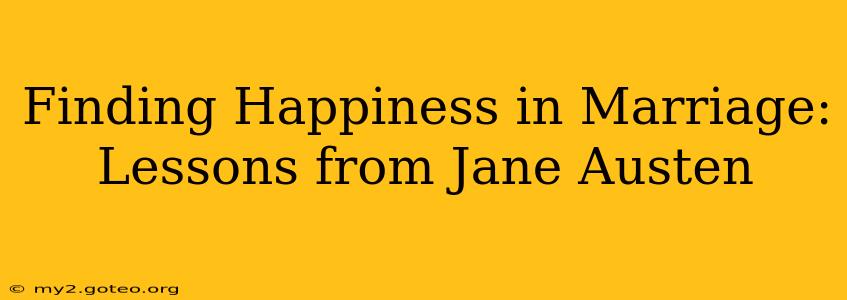Jane Austen's novels, far from being mere romances, offer astute observations on marriage, love, and the pursuit of happiness within the constraints of 19th-century English society. While the societal pressures and expectations of her time differ significantly from our own, the core human desires for companionship, security, and fulfillment remain timeless. By examining Austen's works, we can glean valuable insights into building a happy and lasting marriage, even today.
What are the key ingredients for a successful marriage according to Jane Austen?
Austen doesn't explicitly lay out a recipe for marital bliss, but through her characters' successes and failures, she subtly highlights several crucial elements. A successful marriage in Austen's world, and arguably in ours, hinges on a foundation of mutual respect, genuine affection, and shared values. Characters like Elizabeth Bennet and Mr. Darcy, despite their initial clashes, demonstrate the power of understanding and growth in forging a strong bond. Their journey highlights the importance of intellectual compatibility and the ability to navigate conflict constructively. Conversely, characters like Charlotte Lucas, who marries Mr. Collins for security, illustrate the pitfalls of prioritizing practicality over genuine connection, ultimately sacrificing personal happiness.
How important is love in a Jane Austen marriage?
While financial stability and social standing played significant roles in marriage decisions during Austen's era, love, or at least a strong affection, is often portrayed as a crucial ingredient for a truly happy union. The unwavering devotion between Elizabeth and Darcy showcases a love that transcends societal pressures and develops through mutual respect and understanding. However, Austen also acknowledges that passionate love alone is insufficient. It must be nurtured and supported by shared values, intellectual compatibility, and a willingness to compromise. The marriages that ultimately flourish in her novels often involve a blend of passionate love and enduring affection, a testament to the multifaceted nature of a successful partnership.
What role does financial security play in Jane Austen's depiction of marriage?
Financial security is undeniably a significant factor in Austen's depiction of marriage. The societal constraints of her time placed a heavy emphasis on a woman's financial dependence on her husband. However, Austen doesn't simply portray wealth as the sole determinant of a successful marriage. While characters like Charlotte Lucas prioritize financial security, their marriages often lack the emotional depth and fulfillment seen in unions built on mutual love and respect. Austen subtly suggests that while financial stability provides a necessary foundation, it's not a substitute for genuine connection and shared happiness. A balance must be struck, with financial security contributing to stability but not overshadowing the importance of emotional intimacy.
How do the characters in Jane Austen's novels handle conflict in their marriages?
Austen's novels vividly portray the challenges couples face and how they navigate conflict. Elizabeth and Darcy's relationship provides a compelling example. Their initial disagreements stem from misunderstandings and pride, but their ability to communicate openly, acknowledge their flaws, and ultimately forgive each other forms the cornerstone of their enduring love. In contrast, less successful marriages in Austen's works often show a lack of communication, leading to resentment and unhappiness. Austen implicitly emphasizes the importance of open dialogue, empathy, and a willingness to compromise in resolving conflicts and maintaining a healthy marital bond.
Does Jane Austen offer any advice on maintaining a happy marriage long-term?
Jane Austen's novels, while set in a bygone era, offer timeless wisdom on maintaining a happy marriage. The enduring strength of successful relationships in her stories is linked to the continuous effort invested in nurturing the connection. Mutual respect, open communication, shared values, and a willingness to adapt and grow together are recurring themes. Even in the face of challenges, the couples who thrive show resilience, understanding, and a commitment to working through difficulties. This suggests that sustained happiness in marriage requires ongoing effort, compromise, and a continuous dedication to the relationship's growth and evolution.
This exploration of Jane Austen's works reveals that building a happy and lasting marriage isn't a formulaic process. It requires careful consideration of mutual respect, genuine affection, shared values, open communication, and a willingness to navigate the inevitable conflicts that arise in any long-term relationship. While the social context of Austen's time differs from ours, the fundamental human desires for companionship, understanding, and shared happiness remain timeless lessons.

